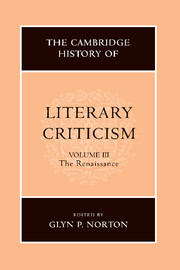Book contents
- Frontmatter
- Introduction
- READING AND INTERPRETATION: AN EMERGING DISCOURSE OF POETICS
- POETICS
- THEORIES OF PROSE FICTION
- CONTEXTS OF CRITICISM: METROPOLITAN CULTURE AND SOCIO-LITERARY ENVIRONMENTS
- VOICES OF DISSENT
- STRUCTURES OF THOUGHT
- NEOCLASSICAL ISSUES: BEAUTY, JUDGEMENT, PERSUASION, POLEMICS
- A SURVEY OF NATIONAL DEVELOPMENTS
- 56 Seventeenth-century English literary criticism: classical values, English texts and contexts
- 57 French criticism in the seventeenth century
- 58 Literary-critical developments in sixteenth-and seventeenth-century Italy
- 59 Cultural commentary in seventeenth–century Spain: literary theory and textual practice
- 60 The German-speaking countries
- 61 The Low Countries
- Bibliography
- Index
- References
57 - French criticism in the seventeenth century
from A SURVEY OF NATIONAL DEVELOPMENTS
Published online by Cambridge University Press: 28 March 2008
- Frontmatter
- Introduction
- READING AND INTERPRETATION: AN EMERGING DISCOURSE OF POETICS
- POETICS
- THEORIES OF PROSE FICTION
- CONTEXTS OF CRITICISM: METROPOLITAN CULTURE AND SOCIO-LITERARY ENVIRONMENTS
- VOICES OF DISSENT
- STRUCTURES OF THOUGHT
- NEOCLASSICAL ISSUES: BEAUTY, JUDGEMENT, PERSUASION, POLEMICS
- A SURVEY OF NATIONAL DEVELOPMENTS
- 56 Seventeenth-century English literary criticism: classical values, English texts and contexts
- 57 French criticism in the seventeenth century
- 58 Literary-critical developments in sixteenth-and seventeenth-century Italy
- 59 Cultural commentary in seventeenth–century Spain: literary theory and textual practice
- 60 The German-speaking countries
- 61 The Low Countries
- Bibliography
- Index
- References
Summary
Seventeenth-century French criticism has generally, and with some reason, been seen as the imposition of a set of doctrines: adherence to ‘the rules’ the imitation of selected and generalized Nature and of the ancients, according to the criteria of probability [vraisemblance] and decorum [bienséance]; the combination of pleasure and instruction; the separation and hierarchy of genres; the dramatic unities. The affirmation of these requirements began in the 1620s, and gathered momentum in the following decade. By around 1660 the neoclassical system was well in place, although it has been argued that its elaboration was only definitively accomplished in the eighteenth century. The content of these doctrines is explicated elsewhere in this volume; the emphasis here is on the significance they assume in the context of the social relationships of seventeenth-century French literature. This is explored via the objects, the implied public, the channels, and the agents, of critical discourse.
‘Criticism’ in late Renaissance France was potentially encyclopaedic in scope: its aim was, through the exegesis of profane and sacred texts, from antiquity and the early Christian era, to make the truths they contained available to the contemporary world. The focus of seventeenth-century criticism is narrower and more concentrated. Its object is a more selective range of texts, what contemporaries often referred to as belles-lettres. Poetry, including theatre, prose fiction (of a romance or a realistic type), letters, and fragmentary works of moral or social reflection (but also history) appear central, works of science, philosophy, theology marginal or absent. The tendency was to preserve, of the humanist critic's activity, only that part which dealt with the linguistic and literary qualities of the text; the concern was more with identifying legitimate sources of textual pleasure than with the text as a source of truth.
- Type
- Chapter
- Information
- The Cambridge History of Literary Criticism , pp. 555 - 565Publisher: Cambridge University PressPrint publication year: 1999
References
- 1
- Cited by

